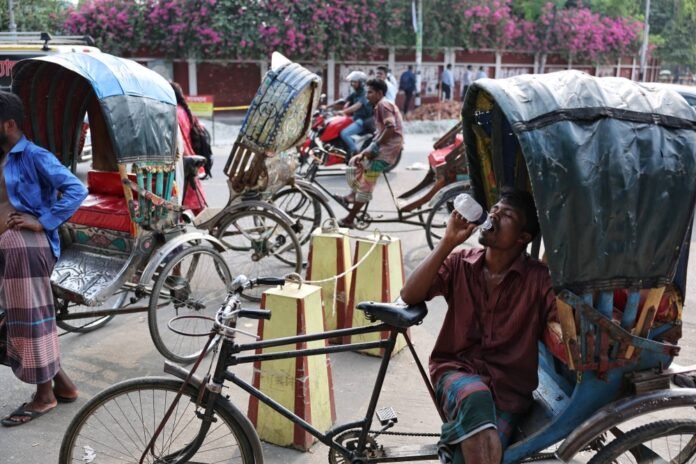Religious scholars in Bangladesh say the country should tap into the generosity of Muslims around the world and use their charitable donations to help the country adapt to climate change.
They said global faith-based financing could be a crucial way to support poor countries, whose need for funds to adapt to climate change is ten to eighteen times greater than the financing they currently receive.
“Being good to others and the environment is seen as an integral part of being a good person in Islam,” says Md. Riaz Uddin, an Islamic scholar and human rights activist from Bangladesh and head of Boroikandi Madrasa, a religious seminary.
Riaz Uddin said there are several forms of charity that are mandatory or voluntary for Muslims, but all of which can be used to support people who are destitute or exposed to serious risks from climate change and natural disasters.
Zakat – giving to the poor and needy, mandated by Islam – has the potential to raise nearly $9.8 billion in Bangladesh alone, according to a study last year.
Bangladesh needs about $9 billion annually for climate adaptation, Minister of Environment, Forests and Climate Change Saber Hossain Chowdhury said last month.
Giving zakat is obligatory for all Muslims with wealth above a certain threshold, to support the poor, the debtor or those migrating with limited resources.
In Bangladesh, people usually give informally and at their own discretion – often by handing out clothes to poor relatives or people in the neighborhood. Riaz Uddin said this had limited long-term impact on the lives of beneficiaries.
Zakir H Khan, CEO of Dhaka-based research organization Change Initiative, has studied the potential of Islamic charities to finance climate action. He said that given the amount of money donated each year, better coordination would do more to help the most climate-sensitive groups.
“Rather than using the charity money for one-off charities, the money could be pooled and used in a planned way to change the lives of climate survivors,” Khan said.
Clean water
Some organizations are already using zakat to adapt to climate change.
Wateraid, an international non-governmental organization focused on water, sanitation and hygiene, uses Islamic charity donations to build water solutions for salinity-affected communities in countries in the Global South with large Muslim populations, such as Bangladesh, Pakistan and Mali.

A child playfully takes a dip in a lake to take a break from the heat on a summer afternoon in Dhaka on Monday.. | AFP-JIJI
“We raise a lot of zakat money from countries like Britain to help communities on the frontlines of the climate crisis,” said Hasin Jahan, Wateraid’s country director in Bangladesh.
On the southwest coast of Bangladesh, for example, religious schools are struggling to provide students with clean drinking water because there is little money to address problems such as increasing water salinity, which is exacerbated by climate change.
Wateraid targets girls and young women in these areas whose needs are often neglected.
“Salt-free drinking water at school is a relief – and we also get free sanitary towels to protect our health,” says Suraiya Khatun, a 15-year-old student from the region.
Islamic schools teach approximately 2.8 million children in Bangladesh. They are now seeking international religious donations to address increasing heat, salinity and other climate-related hazards that are increasingly impacting student health.
Religious scholars agree
One country that has made progress in using Islamic charities for climate action is Indonesia – a country that needs $323 billion to meet its climate goals by 2030.
Indonesia’s Council of Religious Scholars issued rulings this year on how zakat could be used to build water facilities, or provide trusts with land or money to plant more forests.
There have been discussions about using Islamic charities to address climate needs, but religious scholars and financial experts are concluding that it can be used.
“We hope that people will now get clarity that religious scholars agree that climate change is real and that our scriptures teach us to protect the people’s future,” said Hayu Prabowo, chairman of the Environment and Natural Resources Body. Indonesian Ulema Council. of Indonesia’s best Islamic scholars.
World Bank estimates show that zakat financing could range from 1% to more than 4% of the gross domestic product of Muslim countries such as Bangladesh, Indonesia or Sudan – which could act as a social safety net for the poor and vulnerable.

Muslims pray specifically for rain on the streets on Tuesday during a region-wide heat wave in Dhaka, Bangladesh. | REUTERS
Faith-based climate finance must choose the right mix of instruments and technology to meet the needs of beneficiaries, said Prabowo, who is also a trustee of Faithinvest, a network of impact investors from different faith groups.
For example, Zakat can only be used to help poor Muslims, but other forms of giving such as sadaqah, which is purely voluntary, can support people of any faith. A third financing method is called waqf can be provided to institutions for long-term investments.
A range of organisations, including Wateraid, are using sadaqah funding, while Indonesia is using ‘green waqf’ funds to create forests on degraded land.
Technology is critical at every stage of the faith-based financing process, from raising money to implementing projects and ensuring trust in the process, Prabowo said.
Organizations like Wateraid are collecting zakat donations online, while Indonesian scientists are working to use blockchain technology to show people where their money is being spent.
“Faith-based philanthropy has enormous potential to drive climate action – and with more and more good examples on the ground, I hope that faith-based climate finance will gain momentum,” said Prabowo.



